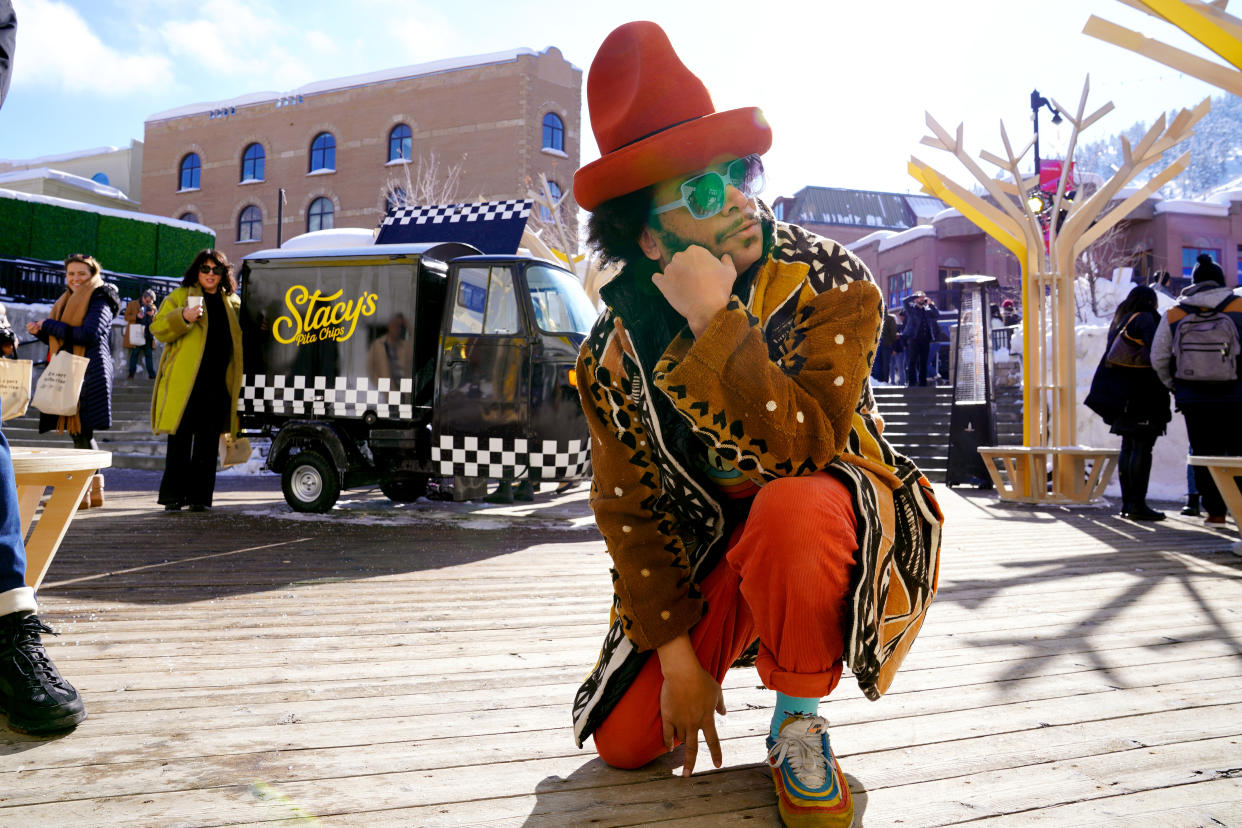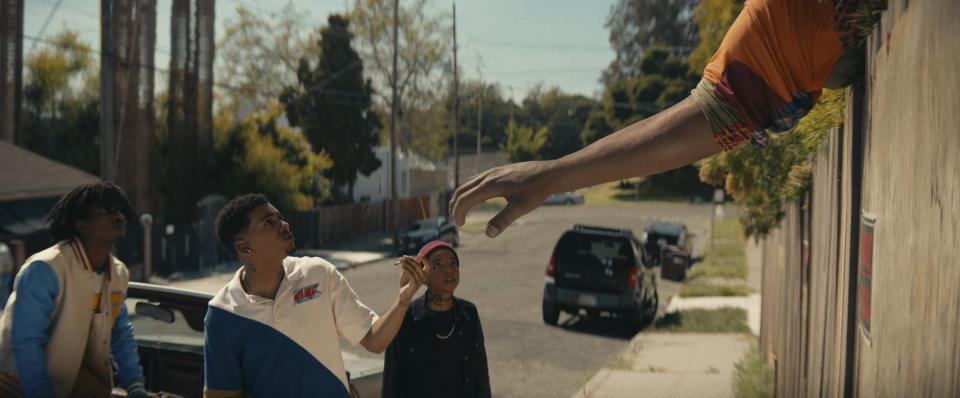Hustling with Boots Riley: Take Hollywood Money Without Selling Out (Column)

This year’s SFFILM, San Francisco’s long-running film festival, opened outside city limits. On Thursday, Ryan Coogler took the stage at Oakland’s Grand Lake Theater to introduce “Stephen Curry: Underrated,” the documentary he produced, and pointed to the middle of the room. “I saw my first movie right there,” he said.
For all the history around Bay Area filmmakers, from the early days of Frances Ford Coppola and George Lucas to the Pacific Film Archive, Oakland’s presence has gained traction. Beyond Coogler, there’s another filmmaker whose relationship with the scene goes much deeper.
More from IndieWire
The Last Living Star of 'Sunset Boulevard' Finally Tells Her Own Hollywood Tale
The Erotic Power of 'Hocus Pocus,' Han Solo, and Megan Mullally: Mae Martin's First Thirst
Boots Riley rose to fame as the frontman for legendary Oakland hip hop group The Coup more than 30 years ago. He reinvented himself as a filmmaker with 2018 Sundance breakout “Sorry to Bother You,” a riotous workplace satire that doubled as a vessel for Riley’s longstanding Socialist values and investment in empowering the working class. Now he’s finished the remarkable Amazon miniseries “I’m a Virgo,” the spunky escapes of a 13-foot-tall teenager (Jharrel Jerome) who escapes his insular household to engage with local activism. The first four episodes screen as SFFILM’s closing night selection next week; it premieres on Amazon Prime in June.
From what I’ve seen, the show is hilarious, strange, and tragic with a spiky underground quality unique to Riley’s sensibilities. It’s altogether remarkable that he pulled it off with Amazon resources. When I met him at Oakland’s Telegraph Beer Garden this week, he told me that “I’m a Virgo” cost $53 million — nearly 17 times as much as his debut feature — and he felt like compromised nothing. Not that it was easy.
“I had to fight for so much all the time,” he said. “It felt like a lot of people were operating from fear.” He sipped his IPA. “I guess the nutshell of it is that the bureaucracy in TV is much bigger than in independent film.”
As I wrote in January, the notion of the Sundance breakout is a myth and Riley’s experience bears this out. He directed “Sorry to Bother You” after years of workshopping the script (including an assist from the Sundance lab) and made it for $3.2 million. When that budget leaked, it led to lowball offers and it ultimately sold to Annapurna for around what it cost to make. Riley, however, had incurred personal debt under the assumption that he was on the verge of a bigger payday.
“So many people that were like, ‘Oh, I know this is going to be the talk of Sundance,” he said. “Everything at Sundance for the past few years that was the talk of Sundance was like $10 or $17 or $20 million. So at the end of Sundance, I was kind of angry and depressed. Up until then, I’d been squatting in a place and we had just kind of worked it out with the bank, who were going to start renting it to us, and stuff like that. I owed a lot of money to a lot of people.”
Now the 52-year-old Riley speaks as a seasoned filmmaker and musician, and realizes he can be most effective by doubling down on his Oakland identity. Wearing a large felt hat that shielded his eyes from the sun, Riley greeted multiple friendly faces at the beer garden, some of whom he didn’t know. “I think people gained some sort of pride about me,” he said. “It’s not just that they love the work. They feel like they’re a part of me.”
Empowered by that impact, Riley believes in developing a career on the local level even while navigating Hollywood resources from afar. Here are some of his biggest takeaways.
Stick to Your Community
Riley never planned to leave Oakland, even when he scored representation as a writer-director. “We were kind of pushed in that direction since the ’90s,” he said, referencing his music days. “Like, ‘Oh, you got to be where all this other stuff is going on.’ But I think from when I was an organizer, the thing that was instilled in me was that you’re most effective in the place you’re from. It wasn’t about going where the action is — it was about making the action happen where you are. I’m a better artist when I know what’s around me.”
For “I’m a Virgo,” some of the interiors were shot in New Orleans, but Riley pushed back on pressure to set the story there. “I was like, ‘I don’t know New Orleans,'” he said. “It’s a beautiful city. For the people who live there, it means something else, and they may shoot it in a different way. Noah Baumbach, Jim Jarmusch and Woody Allen, are New York filmmakers. There’s something that comes across in their films with their knowledge of the city. I want to my work to be here, not because Oakland is the best place, to be honest, but it’s the best place for me.”
Invest in the Scene
Riley said that while he appreciated SFFILM, he felt that Oakland lacked a central hub for its own filmmaking scene. With director Cheryl Dunye (“The Watermelon Woman”), “Sorry to Bother You” producer George Rush, and other filmmakers, they created local non-profit Cinemama, with the intention of creating a screening and event space. “A big problem with the Bay Area is that there are a lot of filmmakers here that do stuff, but there’s no scene,” he said. “There’s no place where people are hanging out.” He hopes Cinemama will program local film series as they make plans for a physical space.
Take the Money, Keep Your Values

Courtesy of Prime Video
Riley’s activism might strike a paradox with the prospects of making a show for Amazon, a corporation not exactly known for respecting workers’ rights. He untangled the apparent contradiction. “Honestly, it’s not the first choice I would have made,” he said, noting the show had been shopped around. “But I’ve heard executives be like, ‘I’m so glad I can work on something I can actually believe in.'”
He recalled an experience with The Coup when he went on a road trip with Dead Kennedys frontman Jello Biafra, another Bay Area figure. For three hours, Biafra held court on the history of punk, with one sore point.”He was really critical of The Clash,” Riley said. “He was like, ‘Fuck The Clash, they’re sellouts, they made music for Sony. We kept it real!'” Riley didn’t see it that way. “Maybe The Clash weren’t as clearly against capitalism as I am, but they got to way more people,” he said.
The Coup, he added, took deals with EMI Records and Warner Brothers, among others. “Look,” he said. “Most people are against the way things are. But the main thing is we’re taught we can’t do anything about it. People are like, ‘Yeah, I don’t like the way capitalism works, but I can’t do anything about it. I’ve got to get a job somewhere.'” For Riley, the ability to make an anti-capitalist argument in a corporate context is all the justification he needs to do the work.
“I’m trying to get people specifically to organize at their place of work, including at Amazon,” he said. “They should be able to shut shit down. It’s part of a movement that can eventually grow into something and create a new society, a whole new system.”
Don’t Self-Censor
“I’m a Virgo” has a lot of audacious swings, including the decision to use forced perspective over CGI. But nothing in the first four episodes is more memorable than an imaginary sex scene between two characters whose sizes would suggest they’re incompatible. It’s a bold maneuver that stands out in part because so few writer-directors would even try going there.
Riley said he was inspired by “Nashville” writer Joan Tewkesbury, who advised him in the Sundance labs. “I remember one time she said to us, ‘Everyone needs to make their characters human,'” he said. “And you know one thing about humans? Humans like to fuck. And you desexualize your characters, you’re doing everybody a disservice.”
Riley said he was concerned that newer writer-directors self-censor. “I think humans still want the same stuff,” he said. “They want to be challenged. But one thing that kind of happened with attacking people rightfully for abuse was that some of the stuff that got tangled up in that was a shame around sex itself. How do we talk about humanity with a PG-13 lens on everything?”
Find a Routine and Stick to It
Riley said that even after his Sundance experience, he’s been cautious about avoiding commercial gigs.
“I’ve been broke a lot in my life,” he said. “I’ve had people mad at me because I won’t take things.” But he’s found a rhythm for writing constantly to ensure he always has a few potential gigs around the corner. In the aftermath of “Sorry to Bother You,” he banged out three scripts — one that became “I’m a Virgo” and two other features. The other two — which he can’t discuss yet — have already secured financing and cast.
“I wake up at 5:30 in the morning,” Riley said. “And I usually am writing the thing I’m not working on for four straight hours. I take the wifi off my laptop. Knowing that I’ll do that every day releases a lot of pressure. I might only get a few lines, or I might get five pages, but those four hours are going to come and go, no matter what.” He smiled. “I get a lot of shit done.”
Riley’s situation is unique: Not all struggling artists can pivot from one profession to another with an existing career to support their profile. But his ability to double down on his surroundings and develop a work ethic that can support his specific vision does prove that filmmakers don’t have to let the system devour them in order to survive.
As usual, I welcome feedback to this week’s column and may run it in an upcoming installment: Eric@indiewire.com
Best of IndieWire
New Movies: Release Calendar for April 14, Plus Where to Watch the Latest Films
From 'Nymphomaniac' to 'Little Ashes': Unsimulated Sex Scenes in 40 Films
Quentin Tarantino's Favorite Movies: 51 Films the Director Wants You to See
Sign up for Indiewire's Newsletter. For the latest news, follow us on Facebook, Twitter, and Instagram.

 Yahoo News
Yahoo News 
